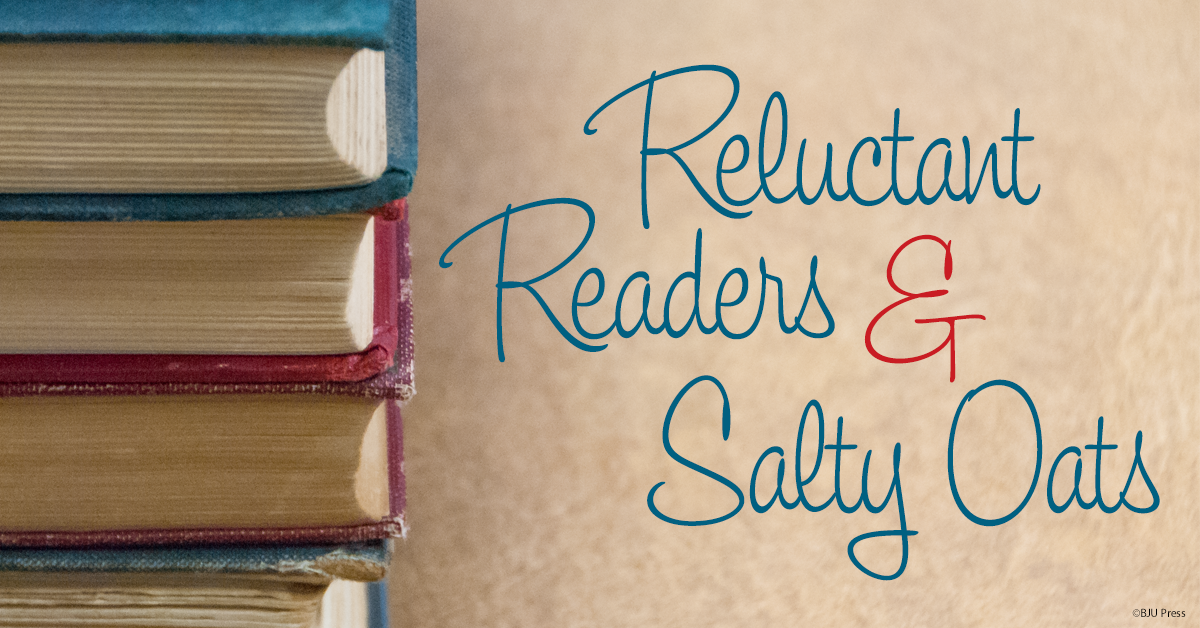Do any of the readers at your house fit one of these categories?
- They can read, but they don’t like to.
- They have difficulty selecting books they think they will like.
- They can’t navigate the reading level of books on topics they’re interested in.
Reading skills may be one part of the issue at hand, but another part has to do with the need to develop a love for the written word—information that serves a need, humor that tickles a funny bone, or simply a story that can be enjoyed or appreciated. If reading is hard and seems to have little benefit to a developing reader, reluctance is a reasonable response, even if not the response you want to see.
Love for the written word is a love you cannot force on someone else. We all know the saying “You can lead a horse to water, but you can’t make him drink,” and that may be where you are in attempting to turn your child into a satisfied reader. So let’s add a corollary: “You can put salt in his oats.”

Book Selection
Here are some proven ideas about how you can develop a thirst for reading by how you choose books.
- Visit the library regularly so that your reader is comfortable there. Allow your child to select his or her books for leisure reading. The reader gets to choose; the parent gets to approve (or redirect, if necessary). Pay attention to what is being selected to understand where interests lie.
- Look for books that are:
True stories—adventures, events, biographies
Factual—science- or history-related books in the nonfiction section of the library
Hands-on guides—project or craft instructions
Adventure novels with fast-paced, action-driven plots
Topics your reader is passionate about
- Look for books with:
Short chapters
Accessible sentence structure (not overly long or complex)
Plenty of white space between lines and in the margins
Comfortable font size
Illustrations that are appropriate to the age of your reader (not off-putting to your reader because they seem juvenile)
- Ask for title recommendations—Learn what has engaged other readers who have similar interests as your own readers. Consider, for example, a new title from JourneyForth that your reluctant reader might enjoy: Nick Newton Is Not a Genius features a merely average boy from the imaginary country of Thauma. Nick’s not brilliant like his mom and dad or a child prodigy like his sister, but he doesn’t let that stop him from uncovering the mysteries of a clockwork factory or revealing a war hero’s greatest secret.
Book Engagement
And you may be able to create a thirst for good books by trying out these ideas for getting your reader involved in reading.
- Read aloud—Among the many benefits of reading aloud is the ease of being captivated by the words and the story, which becomes its own reason to learn to read independently. (Note: The age range for listening to books is from birth to age 102, and that end age is flexible.)
- Listen to audio books—This is another way to “read aloud” with the added benefit of hearing some well-produced dramatic presentations. Many audio books can be checked out as digital downloads through your local library system with apps from OverDrive® or hoopla.
- Read cooperatively—You and your child share the reading, alternating paragraphs or letting one read the narrative and the other the dialogue (what the characters say). Break the text into manageable bits. You lift part of the reading load while your partner views the words you’re vocalizing.
- Read for fun—Pack up a blanket and some books (food optional), and go on a book-nic. Sit, lie, or sprawl at a local park or in your backyard and just read.
- Read shorter works like magazine articles, short stories, or poetry—Sometimes the sheer volume of a book can be daunting, so remove that concern.
Do you have salty oats ideas that have helped your reluctant readers? We’d love to hear from you.
• • • • •
Nancy Lohr is acquisitions editor at JourneyForth, a division of BJU Press. She has edited dozens of books over the last twenty years and is a writer as well, having authored two historical novels for children, curriculum stories and articles, and numerous book reviews and articles for parents and educators. Nancy was an educator and children’s librarian before moving into publishing, and she loves to see young readers develop into capable and satisfied readers.
That’s a great idea, Martie! That’s salt in the oats. :)
For our children, bedtime was always at 8 PM. (On school nights). However, if they wanted to read a book in bed – they could keep their reading lights on until 8:30. (NOTHING else could be done during that time. If they didn’t want to read a book – it was time for bed.) All of them loved being able to stay up 30 minutes longer – and all of them enjoyed reading during this time.